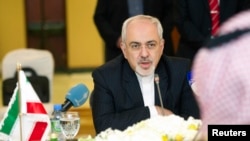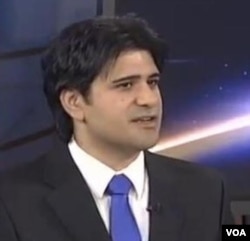WASHINGTON, D.C. —
Following its recent nuclear agreement with the six world powers, analysts say Iran is actively looking to mend fences with its Gulf neighbors. Foreign Minister Mohamed Javad Zarif recently completed a whirlwind tour of four of the six countries of the Gulf Cooperation Council (GCC) and secured promises of reciprocal visits. But mistrust of Iran runs high in the Gulf, particularly in Saudi Arabia and Bahrain, and experts say Tehran’s recently diplomatic initiative is unlikely to sway its wary neighbors.
Thomas Mattair who is Executive Director of the Middle East Policy Council in Washington, D.C., says suspicion of Iran among the Gulf Arab starts with the fact that Iran is a revolutionary state whose agenda is in conflict with both Western nations and its Gulf neighbors.
“It’s also a regime that has instigated unrest in the Arab Gulf states,” Mattair said. “It has cultivated Shia communities that are minorities and encouraged their protests and it has engaged in terror in these states—not recently, but recently enough to be remembered and to be a concern.”
Mattair points out that Iran took advantage of the U.S. intervention in Iraq to infiltrate Revolutionary Guards into Iraq, challenge U.S. forces, shape Iraqi militias and, he says, ultimately gain influence over the government of Nouri al-Maliki.
“And that is a very big potential threat to the Gulf Arab leaders, to see Iran in such a position of power in Iraq,” Mattair said.
Iran, he says, is helping fuel sectarian conflict in Syria by siding with the Syrian government in what has increasingly become a sectarian conflict between Bashar al-Assad’s largely Alawite army and Sunni rebels.
“And so when the Sunni Arab leaders see Sunni Arabs being slaughtered in Syria by an Alawite regime - an offshoot of Shi’ism, supported by Iran - they face domestic pressure from their own Sunni populations to do something about this," he said.
Mattair also says Gulf Arab states view Iran as a geopolitical threat in terms of its conventional and covert capabilities. “It’s a big, looming powerful country from the perspective of the Gulf Arab regimes,” he said, “and that is why they also spend so much time and money building their defenses."
Majid Rafizadeh is an American political scientist, analyst and commentator on the Middle East and Iran. He says Iran is unlikely to fundamentally change its behavior toward its regional Gulf neighbors because, as he puts it, “from the perspective of Iranian leaders and particularly Ayatollah Ali Khamanei, Iran's supreme leader, any change would lessen Iran's influence and diminish Tehran's power and leverage, regionally and internationally.”
Rafizadeh says the GCC states are generally suspicion of Tehran's intention to halt its nuclear program, as demonstrated in leaked U.S. diplomatic cables which reported that Saudi Arabia’s King Abdullah called on the U.S. to “cut off the head of the snake” by destroying Iran’s nuclear sites in a military strike.
“It is also crucial to point out that this is not the first time that Iran reaches a first temporary deal with the P5+1,” Rafizadeh said. “Eagerness and pressure from both sides usually have contributed to broad first agreements. However, it is less likely that the provisional agreement will lead to an enduring one.”
Rafizadeh says previous agreements have failed over Tehran’s objections to site inspections or when Tehran has disputed the interpretation of the text of an agreement previously agreed to by all parties.
“Iran's stand on its nuclear program and the P5+1 and the West's position seem to be too deep to bridge,” Rafizadeh said.
While Tehran’s recently diplomatic flurry might improve relations with its GCC neighbors in small ways, Rafizadeh believes that the underlying geopolitical, ideological, sectarian, and strategic tensions with Gulf Arab neighbors are too deep and complex to resolve anytime soon.
Thomas Mattair who is Executive Director of the Middle East Policy Council in Washington, D.C., says suspicion of Iran among the Gulf Arab starts with the fact that Iran is a revolutionary state whose agenda is in conflict with both Western nations and its Gulf neighbors.
“It’s also a regime that has instigated unrest in the Arab Gulf states,” Mattair said. “It has cultivated Shia communities that are minorities and encouraged their protests and it has engaged in terror in these states—not recently, but recently enough to be remembered and to be a concern.”
Mattair points out that Iran took advantage of the U.S. intervention in Iraq to infiltrate Revolutionary Guards into Iraq, challenge U.S. forces, shape Iraqi militias and, he says, ultimately gain influence over the government of Nouri al-Maliki.
“And that is a very big potential threat to the Gulf Arab leaders, to see Iran in such a position of power in Iraq,” Mattair said.
Iran, he says, is helping fuel sectarian conflict in Syria by siding with the Syrian government in what has increasingly become a sectarian conflict between Bashar al-Assad’s largely Alawite army and Sunni rebels.
“And so when the Sunni Arab leaders see Sunni Arabs being slaughtered in Syria by an Alawite regime - an offshoot of Shi’ism, supported by Iran - they face domestic pressure from their own Sunni populations to do something about this," he said.
Mattair also says Gulf Arab states view Iran as a geopolitical threat in terms of its conventional and covert capabilities. “It’s a big, looming powerful country from the perspective of the Gulf Arab regimes,” he said, “and that is why they also spend so much time and money building their defenses."
Majid Rafizadeh is an American political scientist, analyst and commentator on the Middle East and Iran. He says Iran is unlikely to fundamentally change its behavior toward its regional Gulf neighbors because, as he puts it, “from the perspective of Iranian leaders and particularly Ayatollah Ali Khamanei, Iran's supreme leader, any change would lessen Iran's influence and diminish Tehran's power and leverage, regionally and internationally.”
Rafizadeh says the GCC states are generally suspicion of Tehran's intention to halt its nuclear program, as demonstrated in leaked U.S. diplomatic cables which reported that Saudi Arabia’s King Abdullah called on the U.S. to “cut off the head of the snake” by destroying Iran’s nuclear sites in a military strike.
“It is also crucial to point out that this is not the first time that Iran reaches a first temporary deal with the P5+1,” Rafizadeh said. “Eagerness and pressure from both sides usually have contributed to broad first agreements. However, it is less likely that the provisional agreement will lead to an enduring one.”
Rafizadeh says previous agreements have failed over Tehran’s objections to site inspections or when Tehran has disputed the interpretation of the text of an agreement previously agreed to by all parties.
“Iran's stand on its nuclear program and the P5+1 and the West's position seem to be too deep to bridge,” Rafizadeh said.
While Tehran’s recently diplomatic flurry might improve relations with its GCC neighbors in small ways, Rafizadeh believes that the underlying geopolitical, ideological, sectarian, and strategic tensions with Gulf Arab neighbors are too deep and complex to resolve anytime soon.












